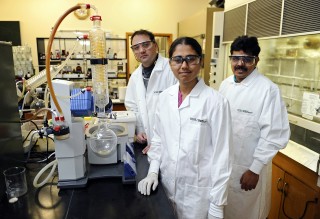Nov 26 2014
Researchers at North Dakota State University, Fargo have developed a method of producing biomass plastic which can be broken down and reduced to molecules upon exposure to a specific light.
The reduced substances can then be used to form a new plastic. Plastic is a key component in almost everything today, from electronics to vehicles and packaging. It is often deposited in oceans and landfills after being discarded.
 Researchers at North Dakota State University, Fargo, have developed a process using biomass to create plastic which can broken down by exposing it to ultraviolet light at 350 nanometers for three hours. Published in the journal Angewandte Chemie, the proof of concept experiment outlines the work of researchers in the Center for Sustainable Materials Science at NDSU.
Researchers at North Dakota State University, Fargo, have developed a process using biomass to create plastic which can broken down by exposing it to ultraviolet light at 350 nanometers for three hours. Published in the journal Angewandte Chemie, the proof of concept experiment outlines the work of researchers in the Center for Sustainable Materials Science at NDSU.
Besides oilseed from agricultural crops, the researchers also used sucrose, lignin, and cellulose to create molecules that are converted into polymers for producing plastics. In order to improve sustainability and reduce dependence on fossil fuels, NDSU along with the North Dakota Experimental Program to Stimulate Competitive Research (ND EPSCoR) formed the Center for Sustainable Materials Science which focuses on preparing composites and polymers using biomass.
However, the researchers in their experiment used fructose from fruits to produce a molecular solution that is made into a plastic. When the plastic was exposed to ultraviolet light at a wavelength of 350nm for three hours, the plastic was degraded and reduced back to soluble molecules.
In general, plastics tend to degrade slowly, leaching chemicals into the environment and forming solid wastes or toxins in air upon burning. By contrast, this breakthrough technique allows the plastic to degrade, eventually resulting in reduced dependence on fossil fuels.
The researchers stated that the team is working on developing novel biomass-based materials using this method, which can be broken down with the help of light.
Further research by the team is focused on evaluating the strength and durability of the plastics from biomass prior to commercialization of the potential product. The findings are published in the Angewandte Chemie journal.